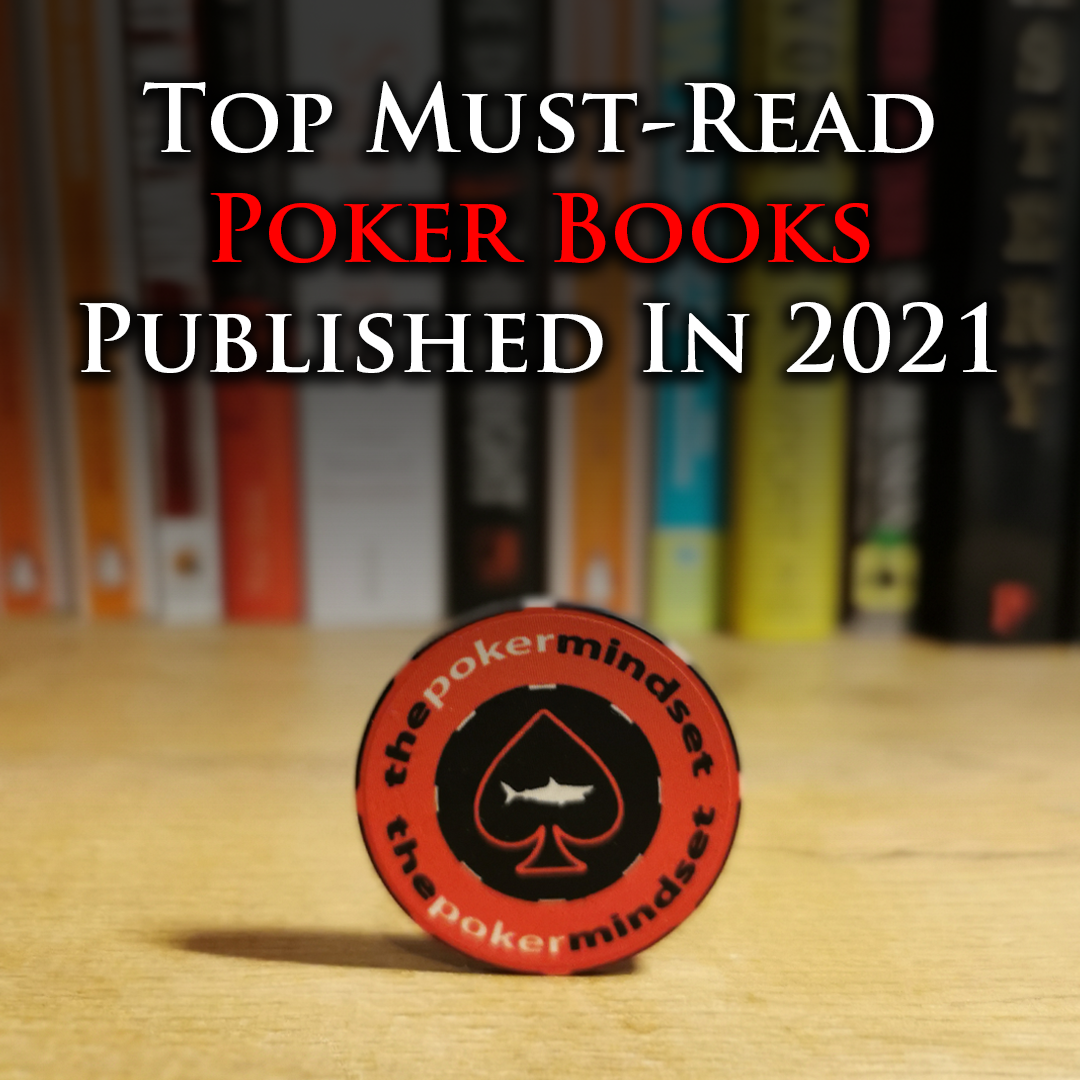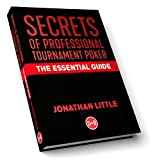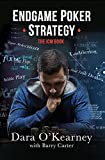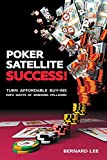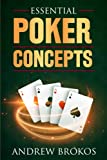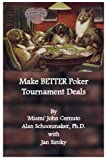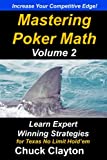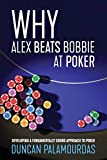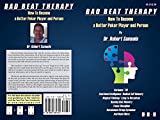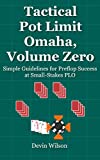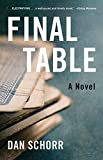“Spend each day trying to be a little wiser than you were when you woke up. Day by day, and at the end of the day – if you live long enough – like most people, you will get out of life what you deserve.” (Charlie Munger)
Reading daily is a superpower. If you commit to improving your poker game by reading something useful every day, no matter how small, your learnings will compound quickly.
In this article we compiled a list with the 10 best poker books published in 2021. Enjoy!
Note: This post contains affiliate links, which means that I make a small commission if you make a purchase, at no extra cost to you. I pay attention to only recommend books that I think are useful for my audience.
1. Secrets of Professional Tournament Poker: The Essential Guide
This new, expanded, fully updated and revised, edition of ‘Secrets of Professional Tournament Poker’ is a landmark in poker publishing.
Originally published in two volumes in 2011 and 2012 this was both a critical and commercial success. Over the last decade, the understanding of poker has changed dramatically and this new edition fully reflects current thinking on the game.
This book will give readers a thorough understanding of everything they need to know about playing tournaments and Jonathan Little is undoubtedly the person best qualified to impart this information.
The book is split into seven sections:
- How Tournaments Work
- Playing Deep Stacked
- Playing Mid Stacked
- Playing Short Stacked
- The Late Stages
- Hand Examples
- Other Considerations
Click here to read the full description and to get the new book from Amazon!
2. Endgame Poker Strategy: The ICM Book (The Poker Solved Series)
Most poker players don’t think they need to study ICM until they make a costly mistake at a big final table – don’t be one of those players.
The Independent Chip Model (ICM) is the most important strategy concept in multi table tournaments, yet very few players understand it, other than knowing they should play tighter on the bubble. Not only does ICM impact the single biggest monetary decisions you make in poker, it also influences everything in a tournament from game selection, staking, when to register, playing the early levels, the bubble, the final table and much more.
Endgame Poker Strategy is the first book to take a deep dive into the subject of ICM and how it impacts how you should play in tournaments. This book contains groundbreaking insights that most professional poker players are not aware of, including:
- How to adjust your play in the late stages of tournaments
- When to ladder and when to play for the win
- How to negotiate profitable final table deals
- The optimal game selection, rebuy and late registration strategies
- How to play short, average and big stacks at the end of tournaments
3. Poker Satellite Success!: Turn Affordable Buy-Ins Into Shots at Winning Millions! By Bernard Lee
Mastering satellite play is a sure-fire way to leverage your bankroll and enables you to make small investments for shots at massive payouts. In this book, poker professional and satellite specialist Bernard Lee explains how.
Inspired by Chris Moneymaker’s epic 2003 WSOP Main Event victory (which he qualified for via a satellite), Lee gained entry to the 2005 Main Event via satellite and eventually finished in 13th place. Since this time, Lee, a Harvard University graduate, has competed in hundreds of satellites and main event tournaments across the world. He has over $2.5 million in career tournament earnings including over ten titles.
In this must-have book on poker satellite play, Lee provides a detailed strategy for playing poker satellites.
Lee discusses in detail:
- Strategy play during different levels of a satellite
- A formula for calculating the satellite ending level
- Short stack strategy on the satellite bubble
- Fascinating and instructive satellite scenarios and stories
- Deal situations and discussions
4. Essential Poker Concepts by Andrew Brokos
Andrew Brokos has more than fifteen years’ experience as a professional poker player, with hundreds of thousands in cash game winnings, final tables in major online tournament series, and three Top 100 finishes in the WSOP Main Event. He has been coaching and writing about poker for nearly as long, with eight books and more than two hundred articles to his name. His work has been published by Two Plus Two Magazine, Card Player, PokerNews, and more.
This volume collects eighteen classic essays on timeless strategy concepts such as range analysis, bluffing, bluff-catching, and game selection. Each offers a quick hit of poker theory in clear, accessible language, with a dash of humor mixed in. Reading these essays is as fun as it is profitable!
Click here to get the book from Amazon!
5. Make BETTER Poker Tournament Deals by John Cernuto and Alan Schoonmaker
YOU make bad deals because you never learned how to make good ones. You just relied on ICM or another computer formula. It was a huge mistake.
If you play tournaments, you need this book. You’ll learn:
1. When to negotiate or keep playing.
2. How to profile and adjust to different types of players.
3. When and how to compete and cooperate.
4. How to set your objectives and plan your initial strategy.
5. How to start negotiating without weakening your position.
6. How to revise your strategy as you get more information.
7. How to handle the end game, the tension-filled final moments when the painful concessions are made or rejected.
8. How to adjust your play when you don’t make a deal.
9. How to restart the negotiations when you tried, but couldn’t agree.
10. How to review what happened to plan future negotiations with these players and develop your overall skills.
Deals end countless tournaments. If you don’t know how to make good ones, you’re giving away hundreds or thousands of dollars every year. You spent money and time learning how to play well enough to reach a few final tables. You don’t get there that often. Spend a few more dollars and hours to get many more dollars.
Click here to read the full description and to get the new book!
6. Mastering Poker Math: Learn Expert Winning Strategies for Texas No-Limit Hold’em by Chuck Clayton
Mastering Poker Math, Volume 2 is the sequel to Mastering Poker Math, Volume 1. Both books teach the practical math of Texas No-Limit Hold ’em and how to integrate it with the rest of your game. They are designed for all serious players willing to do the work to become a powerful player.
Mastering Poker Math Volume 2 is for intermediate to advanced players. It digs deep into the math and other knowledge to help you to:
- Think more strategically at the poker tables.
- Build deep-rooted confidence in your abilities as a poker player.
- Improve your decision-making with imperfect information at the tables.
- Increase your competitive edge by learning poker math at a visceral level.
Mastering Poker Math Volume 2 is full of powerful practical math and knowledge to start using immediately at the poker tables. Click here to get your copy today and increase your competitive edge in tournament poker!
Note: Click here to check out Mastering Poker Math, Volume 1 as well!
7. Why Alex Beats Bobbie at Poker: Developing a Fundamentally Sound Approach to Poker by Duncan Palamourdas
This book was published in 2020 December, but I decided to include it in the top poker books published in 2021 list, because I think Duncan Palamourdas is an amazing author (you might have seen some quotes by him on my Instagram page as well).
Meet Alex and Bobbie, who both like to play poker. Alex is a professional poker player who plays for a living and is a solid long-term winner. Bobbie is a recreational player who plays a decent enough game but mainly wants to have a good time. If you play poker regularly you will meet thousands of players like Bobbie in your games and very few like Alex.
Of course one would expect that, in the long run, Alex will perform better than Bobbie. But have you ever wondered EXACTLY what it is that Alex understands better and does differently to Bobbie?
This is a rather complex question that does not have a simple answer. In this book, UCLA maths professor Duncan Palamourdas addresses this question via a journey through human psychology, game theory, easy-to-understand mathematics and even philosophy. Topics include:
* Understanding the instinctive but unprofitable tendencies of inexperienced players.
* How to identify what a mistake actually is in poker – and how to exploit it.
* Why poker does not revolve around bluffing.
* The great impact of variance in poker and how to account for it.
* How to develop a consistent approach that allows you to play like Alex and not Bobbie.
Click here to get this book from Amazon!
8. Bad Beat Therapy: How To Become a Better Poker Player and Person by Robert Samuels
This book helps poker players deal with tilt, variance, leaks, risk, table image, focus, boredom, tells, and learning. All of these psychological aspects of the game can be improved, but they require radical self-honesty. Not only is it necessary for you to have an accurate assessment of your strengths and weaknesses, but you must learn how to deal with emotions and learn how to learn.
This method is called “bad beat therapy” because tough losses offer a great insight into how people think about themselves and the game. However, due to the high level of negative emotions during bad beats, most people are unable to process important information, and so they are unable to improve.
The lessons and theories presented not only seek to improve your poker playing, but they also can lead to a better life away from the table. What makes this approach unique is that I provide a more realistic and deep understanding of human psychology compared to some other poker guides. Much of this knowledge comes from the field of psychoanalysis, which is often highly misunderstood, yet I argue that the techniques discovered by Freud offer the best opportunity to deal with emotions and thoughts.
9. Tactical Pot Limit Omaha, Volume Zero: Simple Guidelines for Preflop Success at Small-Stakes PLO by Devin Wilson
Pot Limit Omaha is an extremely complex game, with virtually countless scenarios being possible before the flop is dealt. Navigating that preflop complexity is a difficult but vital aspect of playing the game well, as it sets up everything that can happen on future streets.
This book is the result of studying and comparing various preflop simulations and distilling that sophisticated, unexploitable (“GTO”) strategy into something that’s a lot more accessible and workable for most PLO players, whose toughest opponent is often “the house” due to how rake eats into potential profits.
Written specifically to address the undoubtedly important first street of the game, this short book will help you make easy, winning decisions that keep you from paying too much rake or otherwise making common mistakes, without making you so tight that you’re missing good opportunities or never getting paid by your opponents.
Click here to buy the book from Amazon!
10. Final Table: A Novel by Dan Schorr
A political thriller about sexual misconduct in the #MeToo era, one victim’s battle to survive and overcome trauma, and the cable news machine that feeds off titillating scandal coverage and inflammatory confrontation, Final Table draws upon Dan Schorr’s firsthand experience as a New York City sex crimes prosecutor and sexual misconduct investigator to tackle the worlds of political and media dysfunction.
Former White House staffer Maggie Raster is struggling to build her own consulting firm and overcome a recent sexual assault by an ex-boss. Kyler Dawson, a broke former poker champion, desperately needs to gain entry into a controversial but potentially very lucrative international poker tournament. The host nation faces widespread condemnation for the recent murder of a prominent female US journalist, and a pending presidential executive order threatens to prohibit him and others from participating.
Maggie’s chaotic first attempt to promote her new business as a television political analyst brings her to Kyler’s attention, and convinces him that her political smarts and connections can provide the help he needs. When he approaches her for assistance, she must decide whether to agree—in return for a portion of the potential $20 million prize. To succeed, she will have to confront numerous challenges—personal and political, foreign and domestic—including mounting pressure to publicly address the misconduct of her former boss. Kyler also has his own obstacles and upsetting past to overcome, but if they each can outmaneuver their daunting challenges, he might win the tournament—and earn them both a fortune.
Note: Click here to read one of our previously published articles and find out the top 35 must read poker books of all time!
Do you need a quick poker mindset boost? Get my eBook called 25 Poker Mindset Tips Every Player Should Know!


